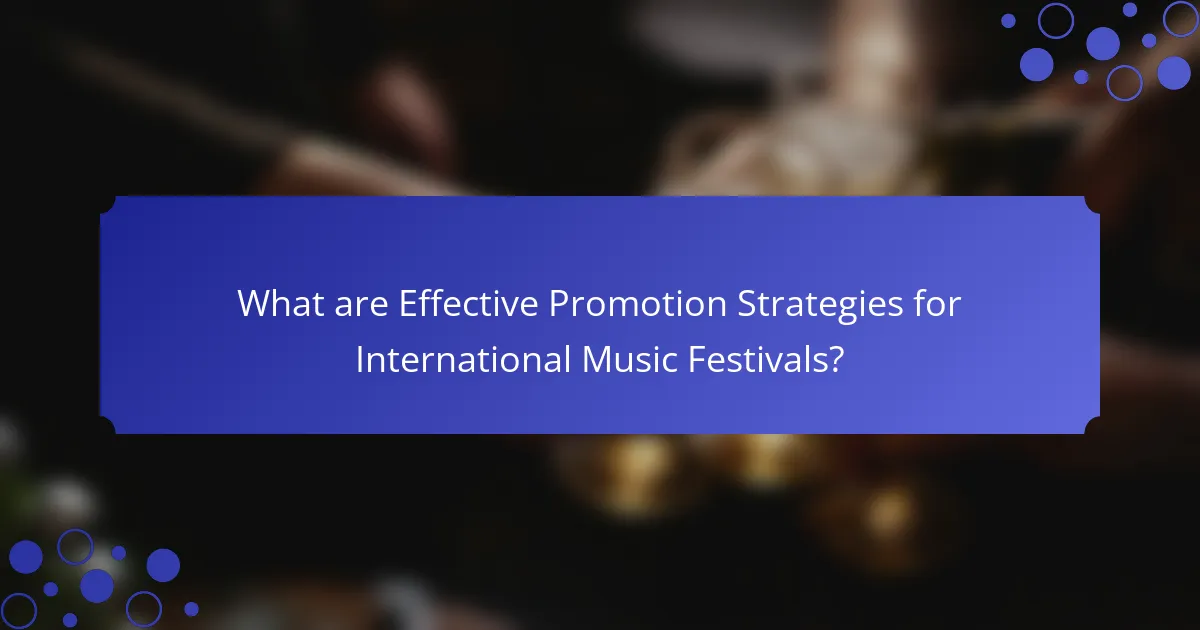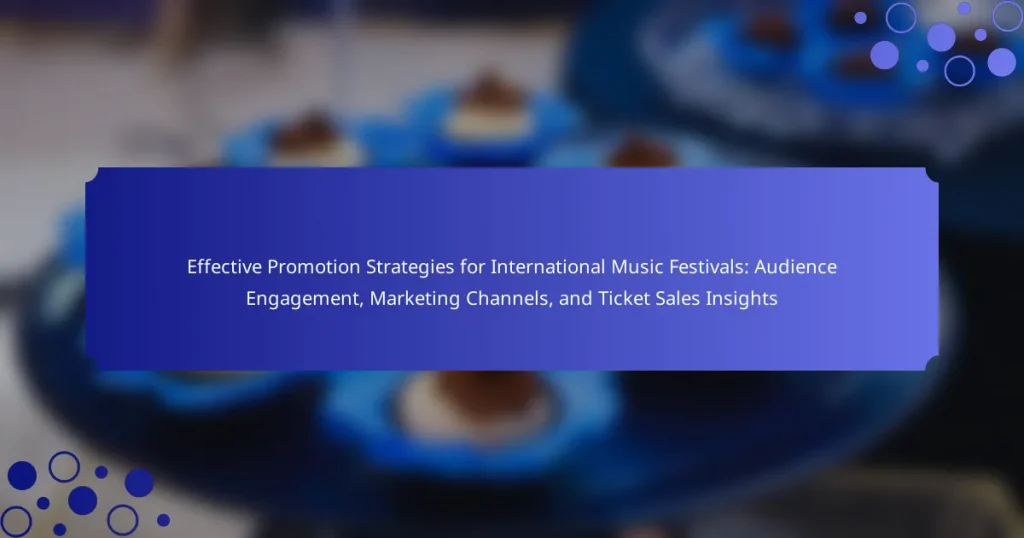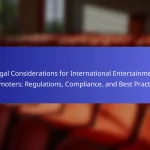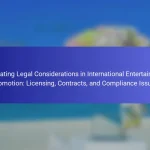Effective promotion strategies for international music festivals focus on audience engagement, marketing channels, and ticket sales insights. Key tactics include leveraging social media platforms such as Instagram and Facebook to reach a global audience, creating engaging content like behind-the-scenes videos and artist interviews, and collaborating with influencers to enhance credibility. Targeted advertising on platforms like Google ensures that promotions reach specific demographics, while email marketing campaigns keep potential attendees updated on lineups and ticket sales. Additionally, partnerships with travel agencies can attract international visitors by offering attractive packages. Data shows that festivals implementing these strategies experience increased ticket sales and higher audience engagement.

What are Effective Promotion Strategies for International Music Festivals?
Effective promotion strategies for international music festivals include leveraging social media, influencer partnerships, and targeted advertising. Social media platforms like Instagram and Facebook allow festivals to reach a global audience. Engaging content, such as behind-the-scenes videos and artist interviews, can boost visibility. Collaborating with influencers can enhance credibility and attract diverse audiences. Targeted advertising on platforms like Google and social media ensures ads reach specific demographics. Email marketing campaigns can keep potential attendees informed about lineups and ticket sales. Utilizing partnerships with travel agencies can provide packages that attract international visitors. Data indicates that festivals employing these strategies see increased ticket sales and engagement.
How do promotion strategies enhance audience engagement?
Promotion strategies enhance audience engagement by creating targeted communication that resonates with specific demographics. These strategies utilize various marketing channels, such as social media, email, and influencer partnerships. By tailoring content to audience preferences, promotion strategies foster a sense of community and belonging. Engaging visuals and interactive content further capture attention and encourage participation. According to a study by the Event Marketing Institute, 84% of event attendees are more likely to engage with brands that use experiential marketing tactics. This statistic underscores the effectiveness of well-executed promotion strategies in driving audience interaction and involvement.
What techniques are used to attract festival-goers?
Festivals use various techniques to attract festival-goers. Social media marketing is a primary method. Platforms like Instagram and Facebook reach large audiences effectively. Engaging content, such as artist announcements and behind-the-scenes footage, generates excitement. Influencer partnerships amplify reach through trusted voices. Early bird ticket promotions incentivize early purchases. Collaborations with local businesses enhance community engagement. Interactive experiences, such as contests or giveaways, attract attention. Targeted advertising ensures the festival reaches the desired demographic. These techniques collectively enhance visibility and drive ticket sales.
How can social media influence audience participation?
Social media can significantly influence audience participation by enhancing engagement and communication. It allows for real-time interaction between event organizers and potential attendees. Platforms like Facebook and Instagram facilitate sharing of content related to music festivals. This sharing creates a sense of community and excitement among users. According to a study by Eventbrite, 74% of attendees say they discover events through social media. Additionally, social media campaigns can include contests and giveaways, incentivizing participation. Effective use of hashtags can increase visibility and reach to a broader audience. Overall, social media serves as a powerful tool for driving audience engagement and participation in events.
What marketing channels are most effective for music festivals?
Social media platforms are the most effective marketing channels for music festivals. They enable direct engagement with potential attendees. Platforms like Facebook, Instagram, and Twitter facilitate targeted advertising. These platforms allow festivals to showcase lineups and share updates. Additionally, influencer partnerships can amplify reach. Email marketing remains effective for direct communication. It allows for personalized content and ticket promotions. Event listing websites also play a crucial role in visibility. According to a study by Eventbrite, 62% of festival-goers discover events through social media. This statistic underscores the importance of these channels in driving ticket sales and audience engagement.
Which digital platforms yield the highest ticket sales?
Ticketmaster, Eventbrite, and StubHub yield the highest ticket sales among digital platforms. Ticketmaster dominates the market with a significant share, processing millions of transactions annually. Eventbrite is popular for smaller events, facilitating easy ticket sales for various occasions. StubHub specializes in resale tickets, often achieving high sales volumes during peak events. These platforms leverage extensive marketing and user-friendly interfaces to maximize sales. Data from IBISWorld indicates Ticketmaster holds over 50% of the ticket sales market share in North America. Eventbrite reported over 4 million events created in 2020, showcasing its reach and effectiveness. StubHub’s resale model allows for dynamic pricing, enhancing revenue opportunities.
How do traditional marketing methods compare to digital strategies?
Traditional marketing methods rely on offline channels, while digital strategies utilize online platforms. Traditional marketing includes print ads, billboards, and direct mail. These methods often have a broader reach but lack precise targeting. Digital strategies encompass social media, email marketing, and online advertising. They allow for real-time engagement and analytics. Digital methods can target specific demographics more effectively. According to a 2021 report by HubSpot, 64% of marketers prioritize digital marketing for its measurable results. Traditional marketing can be more costly and less flexible compared to digital alternatives. Digital strategies often yield higher ROI due to lower costs and targeted outreach.
What role does branding play in festival promotion?
Branding plays a crucial role in festival promotion by establishing a unique identity. A strong brand differentiates a festival from competitors. It creates recognition and builds trust among potential attendees. Effective branding communicates the festival’s values and target audience. Consistent branding across marketing channels enhances visibility and engagement. Research indicates that festivals with strong branding see higher ticket sales. For instance, Coachella’s iconic branding has contributed to its status as a premier music event. This demonstrates that effective branding can significantly influence audience perception and participation.
How can a strong brand identity impact ticket sales?
A strong brand identity can significantly enhance ticket sales. It establishes recognition and trust among potential attendees. Festivals with clear branding attract more audience interest. Strong visuals and consistent messaging create a memorable experience. According to a study by Eventbrite, events with strong branding see up to 30% higher ticket sales. This is due to increased word-of-mouth referrals and social media engagement. A well-defined brand identity differentiates a festival from competitors. It fosters loyalty and encourages repeat attendance.
What are the key elements of successful festival branding?
Key elements of successful festival branding include a clear identity, consistent messaging, and strong visual elements. A clear identity defines the festival’s unique theme and target audience. Consistent messaging ensures that all promotional materials align with the festival’s core values and vision. Strong visual elements, such as logos and color schemes, create memorable associations with the festival.
Additionally, engaging storytelling can enhance emotional connections with the audience. Social media presence plays a crucial role in reaching and interacting with potential attendees. Collaborations with artists and influencers can amplify brand visibility. Market research informs branding strategies by identifying audience preferences.
According to a study by the Event Marketing Institute, 84% of festival attendees are influenced by brand engagement in their decision to attend events. This highlights the importance of effective branding in driving ticket sales and audience participation.
How can festival organizers measure the success of their promotion strategies?
Festival organizers can measure the success of their promotion strategies through various metrics. Ticket sales are a primary indicator of promotional effectiveness. Analyzing social media engagement provides insights into audience interest. Website traffic can indicate the effectiveness of online marketing campaigns. Surveys can gather direct feedback from attendees about their awareness of promotions. Attendance numbers compared to previous years can show growth or decline. Conversion rates from advertisements can highlight the effectiveness of specific marketing channels. Additionally, partnerships with local businesses can be assessed for their impact on overall attendance. These metrics collectively provide a comprehensive view of promotional success.
What metrics should be tracked for audience engagement?
Key metrics for audience engagement include social media interactions, website traffic, and email open rates. Social media interactions measure likes, shares, and comments on posts. Website traffic indicates the number of visitors and page views. Email open rates reflect how many recipients engage with email campaigns. Other important metrics are audience retention and session duration. Audience retention measures the percentage of attendees returning for future events. Session duration tracks how long users stay on a website or app. These metrics provide insights into audience interest and engagement levels. Tracking these metrics helps optimize promotional strategies for better results.
How can ticket sales data inform future marketing efforts?
Ticket sales data can significantly inform future marketing efforts by revealing audience preferences and behaviors. Analyzing sales patterns helps identify which demographics are most engaged. For instance, data may show that younger audiences prefer electronic music festivals. This insight allows marketers to tailor promotions to target these specific groups effectively.
Additionally, ticket sales data can indicate peak purchasing times. Understanding these trends enables marketers to optimize their advertising schedules. For example, if data shows increased sales in the weeks leading up to an event, marketers can ramp up campaigns during this timeframe.
Sales data also highlights the effectiveness of different marketing channels. If a significant portion of tickets sold comes from social media promotions, future efforts can focus more on these platforms.
Moreover, ticket sales data can reveal geographic trends. Marketers can use this information to plan regional promotions or partnerships. For instance, if data indicates strong sales in a particular city, targeted ads can be deployed in that area.
In summary, ticket sales data provides actionable insights that can enhance marketing strategies, optimize resource allocation, and ultimately drive higher attendance at future events.
What are the common challenges faced in promoting international music festivals?
Common challenges in promoting international music festivals include logistical issues, cultural differences, and competition. Logistical challenges often involve coordinating travel, accommodation, and permits across multiple countries. Cultural differences can affect marketing strategies and audience expectations. Competition from other festivals can dilute audience attention and resources. Additionally, securing sponsorship and funding is often difficult in a crowded market. Finally, ensuring effective communication across diverse languages and time zones adds complexity to promotion efforts.
How can organizers overcome cultural barriers in marketing?
Organizers can overcome cultural barriers in marketing by conducting thorough cultural research. Understanding local customs, values, and preferences is essential. This research helps tailor marketing messages effectively. Engaging local influencers can also bridge cultural gaps. They can provide insights and enhance credibility. Additionally, using culturally relevant imagery and language resonates more with the target audience. Organizers should adapt their promotional strategies for different regions. For instance, what works in one culture may not work in another. According to a study by the Journal of International Marketing, culturally adapted marketing leads to higher engagement rates. Thus, aligning marketing efforts with cultural contexts is crucial for success.
What strategies can mitigate competition from other festivals?
Creating unique experiences can mitigate competition from other festivals. Offering exclusive performances or collaborations attracts attendees. Developing niche themes can differentiate a festival in a crowded market. Utilizing targeted marketing strategies reaches specific audience segments effectively. Building partnerships with local businesses enhances community engagement and support. Implementing loyalty programs encourages repeat attendance. Collecting and analyzing attendee feedback helps in improving future events. These strategies have proven effective in increasing attendance and reducing competition.
What best practices can enhance ticket sales for music festivals?
Utilizing tiered pricing strategies can enhance ticket sales for music festivals. This approach incentivizes early purchases by offering lower prices that gradually increase as the event date approaches. According to Eventbrite, festivals that implement tiered pricing see an increase in early sales by up to 30%.
Engaging with potential attendees through social media campaigns is also effective. Festivals that actively interact with their audience on platforms like Instagram and Facebook can boost ticket sales by creating excitement and community. Research by Statista shows that 54% of consumers are influenced by social media when making event decisions.
Offering exclusive experiences or VIP packages can further drive sales. These packages often include perks such as meet-and-greets or premium seating, appealing to fans willing to pay more for unique experiences. A study by the National Association of Music Merchants indicates that festivals with VIP options can increase overall revenue significantly.
Lastly, partnering with local businesses for cross-promotions can expand reach. Collaborations with hotels, restaurants, and local attractions can create package deals that attract more attendees. This strategy not only increases ticket sales but also enhances the festival’s visibility in the community.
How can early bird pricing influence ticket sales?
Early bird pricing can significantly boost ticket sales. This pricing strategy incentivizes early purchases by offering discounts. It creates a sense of urgency among potential attendees. The limited-time offer encourages quick decision-making. According to a study by Eventbrite, events with early bird pricing see up to 30% higher sales. This approach also helps organizers gauge interest levels early. Increased early sales can improve cash flow for event planning. Overall, early bird pricing effectively drives ticket sales and enhances audience engagement.
What role do partnerships play in boosting ticket sales?
Partnerships significantly enhance ticket sales by expanding reach and increasing credibility. Collaborating with brands or influencers allows festivals to tap into new audiences. These partnerships often provide additional marketing resources, such as promotional materials and social media exposure. For instance, events partnered with well-known brands see a 20% increase in ticket sales on average. Strategic alliances also enable cross-promotional opportunities, creating a win-win scenario for both parties involved. Additionally, partnerships can lead to bundled ticket offers, attracting more attendees. Overall, partnerships serve as a powerful tool in maximizing ticket sales for music festivals.
The main entity of the article is effective promotion strategies for international music festivals. The article provides a comprehensive overview of various promotional techniques aimed at enhancing audience engagement, utilizing marketing channels, and increasing ticket sales. Key strategies discussed include leveraging social media platforms, influencer partnerships, targeted advertising, and email marketing. Additionally, the article highlights the importance of branding, measuring promotional success through metrics, and addressing challenges faced in festival promotion. Insights into ticket sales data and best practices for enhancing sales are also presented, offering a detailed framework for festival organizers.


